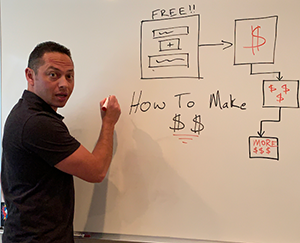Franchise Secrets to Leading Effectively written by John Jantsch read more at Duct Tape Marketing
The Ducttape Marketing Podcast with Tiffany Slowinski In this episode of the Duct Tape Marketing Podcast, I interview Tiffany Slowinski, an entrepreneur and co-owner of three successful franchises. Tiffany shares her journey in the franchise industry, insights on using the Culture Index to improve team dynamics, and the importance of self-awareness in leadership. She discusses […]
Franchise Secrets to Leading Effectively written by John Jantsch read more at Duct Tape Marketing
The Ducttape Marketing Podcast with Tiffany Slowinski
In this episode of the Duct Tape Marketing Podcast, I interview Tiffany Slowinski, an entrepreneur and co-owner of three successful franchises. Tiffany shares her journey in the franchise industry, insights on using the Culture Index to improve team dynamics, and the importance of self-awareness in leadership. She discusses how data-driven information can transform business communication and productivity while addressing common misconceptions about leadership tools. Tiffany Slowinski emphasizes the need for buy-in from leadership and the role of self-awareness in effective team management.
Key Takeaways:
- Transforming team dynamics can lead to increased revenue.
- Communication styles can be adjusted based on team data.
- Data can help identify potential leaders early on.
- Misconceptions about leadership tools can hinder progress.
- Self-awareness is key to effective leadership.
- Leadership buy-in is crucial for implementing change.
Chapters
[00:00] Introduction to Tiffany Slawinski
[01:34] Franchise Journey and Insights
[03:11] The Power of Culture Index
[05:01] Transforming Team Dynamics
[08:50] Addressing Executive Skepticism
[10:46] Common Misconceptions in Leadership
[12:31] Utilizing Data for Effective Leadership
[17:11] Working with Spouses in Business
[19:57] Self-Awareness in Leadership
More About Tiffany Slowinski
This episode of The Duct Tape Marketing Podcast is brought to you by:
Try ActiveCampaign free for 14 days with our special offer. Exclusive to new customers—upgrade and grow your business with ActiveCampaign today!
Testimonial (00:00): I was like, I found it. I found it. This is what I’ve been looking for. I can honestly say it has genuinely changed the way I run my business. It’s changed the results that I’m seeing. It’s changed my engagement with clients. It’s changed my engagement with the team. I couldn’t be happier. Honestly. It’s the best investment I ever made.
John Jantsch (00:16): What you just heard was a testimonial from a recent graduate of the Duct Tape Marketing certification intensive program for fractional CMOs marketing agencies and consultants just like them. You could choose our system to move from vendor to trusted advisor, attract only ideal clients, and confidently present your strategies to build monthly recurring revenue. Visit DTM world slash scale to book your free advisory call and learn more. It’s time to transform your approach. Book your call today, DTM World slash scale.
(01:03): Hello and welcome to another episode of the Duct Tape Marketing Podcast. This is John Jantsch and my guest today is Tiffany Slowinski. She’s an entrepreneur and co-owner of three successful franchises with her husband. Jake is a mother of four. She draws inspiration from both her family and career through Team Spark Advisors. She uses data-driven insights to help businesses improve communication, productivity, and employee satisfaction. She holds a master’s in psychology from Columbia University, enhancing her experience in leadership and team dynamics. So Tiffany, welcome to the show.
Tiffany Slowinski (01:38): Thanks for having me, John.
John Jantsch (01:40): So did I read somewhere it says you have four kids. Do you have four girls? Did I
Tiffany Slowinski (01:44): Read that? Yes.
John Jantsch (01:46): So do I.
Tiffany Slowinski (01:47): Oh, that never happens.
John Jantsch (01:50): Mine are grown and having babies of their own now, but it was fundraising for girls, especially as a dad. I would always get questions like, oh, is that really hard on you? And truthfully, they were way harder on their mother than me.
Tiffany Slowinski (02:03): People are always like, wow, your poor husband. I’m like, I dunno what you want me to do about this right now.
John Jantsch (02:10): I got tired of it. But any rate, so you have and your husband have a lot of history in the franchise industry. In fact, you actually worked corporately for a franchise before getting, tell me a little bit about your franchise background. It seems like you’re very drawn to that model, so you must think it’s a positive model.
Tiffany Slowinski (02:30): Yeah, well, with franchises it’s like just do what you’re supposed to and it takes some of the guesswork out of it. Going into franchises was kind of the opposite of most people in that I opened our franchises with my husband. They’re magazines that we own and most people leave corporate America to open a franchise. I opened my franchise and our franchisor asked me to come work for them. So I went backwards and that was during the pandemic. And we had just recently opened our first franchise that year and we’re having a lot of early success. We were rookies of the year, fastest growing publication the company had seen up to that point. And so they wanted me to come to the corporate level and help do for everybody else what we’ve been able to do with ours, which unsurprisingly is not exactly how that works. You can’t just get everybody else to do what you do.
John Jantsch (03:37): So the Team Spark Advisors is primarily, you primarily use the Culture Index survey to work with folks. There are, I’m familiar with at least eight. There’s probably a hundred of those types of surveys out there. I’ve taken Strength Finders and Colby and some of the other ones that are out there. Is there something about Culture Index that you think makes it particularly effective for business?
Tiffany Slowinski (04:01): My original background with it was in my time working for our corporate franchise, we were clients of Culture Index. I was the end user and I had done all sorts of surveys, like you mentioned, our CEO was really big on that and I, psych background, I always found them somewhat interesting, but I was never so drawn to something as I was Culture Index. And for me it was kind of for a few reasons. One, it just pegged me and everybody around me that I worked with so accurately I’d never seen anything like it. Some of these other surveys we took, there’d be like half of us in the room would be like, oh, we have the same letters or we’re the same. But I’d be like, I don’t understand it. I don’t see it. I don’t think we’re similar, but this paper is saying it.
(04:50): This with Culture Index had a lot more depth to it. There were a lot more possibilities. It wasn’t just your detailed or your social, there was degrees of things and how those traits played together. The other piece is really what’s the differentiating factor? I talked to a lot of businesses. You were like, I’ve done a million of these things until I start talking to them and they’re like, oh, that’s different. I’m really a walk alongside you model. I’m a consultant. I’m not selling you a batch of surveys and saying, Hey, here’s information on your team. Good luck with that. I’ve trained you for an hour. I’m there every step of the way because you’ve got to learn how to actually put it into practice. Otherwise it’s not worth anything.
John Jantsch (05:30): I’ll put you on the spot a little bit. Hopefully you have one that you can pull up quickly. But do you have a business, a case study that you’ve actually worked with a business and they’ve gone through the work and done the work and listened to you and it’s completely changed the team dynamics?
Tiffany Slowinski (05:45): It changes beyond even team dynamics. It changes their revenue. It changes a lot of things because when you don’t have the right people in the right seats that can really drag down progress, can drag down everything. So when I work with a company, first thing I’m doing is going in and getting a baseline on the current employees because a lot of times it’s this whole like, okay, we think we’re good over there, just help us with the new people until you start working with them. And then it’s, oh, maybe we’re not as good here as we thought. And I wound up spending actually more time working with them on their existing teams than the new employees. They always think about the new employees is what they want, but the actuality is it’s really helping them define their existing teams. And I’ve seen this one company I’m working with, they moved people around a little bit. They made some changes that you would’ve thought, are people going to really accept what could feel like a demotion or when they’re going to work basically exploding in their brain every day and it’s not working. Nobody likes to go to work and fail. And that’s what it feels like sometimes for people to be in the wrong seats. John, the old adage, you take your best salesperson and you make ’em sales manager
(07:04): And they’re lousy
John Jantsch (07:05): And they fail.
Tiffany Slowinski (07:07): And that happens a lot. We take our best person and we’re like, okay, since they’re really good at doing the work, let’s make them the leader. And that is a completely different skillset. And you’re taking a person who’s really good at what they were doing and now are they kind of setting them up to fail?
John Jantsch (07:24): Yeah, I often find that there are definitely people that are good at doing the work, so to speak. I am a marketing agency so that do the execution really in a lot of cases don’t like to lead. People don’t like to delegate. They love the doing. And then there are people that they want to delegate everything. They want to have a team doing the things. And sometimes it’s very difficult because there’s work to be done, right? It is like, no, you do this and you do this and you do that. So is there any sort of, I don’t know the right trait or term for this. If somebody takes the culture index or one of these index type of tools, I mean, can you start to say, oh, you’re going to be better as a leader, you’re going to be better as X, or is that actually a mistake to maybe make those assumptions?
Tiffany Slowinski (08:14): It’s not a mistake. It’s helping putting people into the right roles. So I get it. You can’t necessarily take a person with no work experience at all their first job out of college and say, oh, you’re going to be the CEO O because you have the right traits. They still need experience.
(08:33): But if you are seeing early signs of we’ve got data here that supports this person will be good in leadership at some point you can help identify that early. And it doesn’t mean they get to skip all the steps, but it’s letting them know, Hey, we see potential in you. Hang tight. Yes, you have to learn the role. And I know that might kill you a little bit in the meantime, but if you work with us and do a good job, we could fast track you. So showing them the possibility of what the future could look like
John Jantsch (09:00): When you’re out there pitching this sometimes, and I’m sure you run up against some executives that are like, yeah, this is something we’re supposed to do, but it’s like the feel good stuff. Go ahead. What are some skeptical executives? I mean, how do you convince them the value of using a tool like this for both alignment and recruitment?
Tiffany Slowinski (09:22): So it’s really about aligning with the right partners. For me, there are visionary profiles and that’s kind of the fun of sometimes having the data people before I talk to them in that I don’t really have to pitch or convince them of anything. They realize there’s a problem and they’re proactive and they want to solve it. They know there’s people issues. I’ve yet to come across a company that says we’re 10 for 10 on every employee. It doesn’t happen.
Tiffany Slowinski (09:48): We
Tiffany Slowinski (09:48): Like to think we’re good at this, but let’s be honest, it’s really hard because people will present themselves a certain way in an interview process. Social people are four times more likely to be hired. Why they interview? Well, they have those skills. So a skeptic, I’m really not going to come into you. And then we’re probably not a good fit because unfortunately a skeptic at the frontline will sometimes continue to be a skeptic through the process and it winds up hindering things. We don’t get anywhere unless you come in with an open mind. I ask leadership, come in and come in with an open mind that we’re all going to hear things about ourselves we don’t like. There’s no perfect person. I’ve had to swallow some of my own pills about who I am and when you can embrace that and say, I’ve got these gifts and I’m going to work to those, rather than spending all my time worrying about like, oh, I’m low detail, I’m a disaster at organizing things, I knew that, right? So I can have an admin that does those things for me and not beat myself up with a fact. That’s not a strength of mine.
John Jantsch (10:55): Alright, so let’s throw the skeptical ones out because they’re too hard to work with, but there probably are some misconceptions that leaders have. What are some of the common ones that you encounter where people are either not seeing how to use this or seeing it as less than talk about some of the misconceptions that you encounter?
Tiffany Slowinski (11:15): So sometimes there’s a bit of an attitude of I just want to pay for something to fix this.
Tiffany Slowinski (11:21): Yeah.
Tiffany Slowinski (11:22): And I don’t want to have human involvement just go deal with the HR director and let them do this and it’s not going to work. I could take your money, but I’m going to tell you right now, a year from now, you’re going to say, that didn’t work and I’m not going to continue working with you because this is top down. If there’s not buy-in at the leadership level and there’s some work to be done
Tiffany Slowinski (11:47): At
Tiffany Slowinski (11:47): The leadership level, and these are busy people who have other things they need to do, but if they invest little bit of time upfront, this starts to become something that’s incorporated down. If we try to start this at a lower level, it’ll never infiltrate up. It’s too easy to go back to our ways. It’s too easy to say, well, this person has this great resume. I like them. They came from our biggest competitor. Just hire them and you will take my data and you will throw it in the garbage can because it doesn’t say what you want it to say. And so if you haven’t worked on this with me, you’re not going to have a belief in the product and you’re kind of wasting your money at that point.
John Jantsch (12:26): It’s my pleasure to welcome a new sponsor to the podcast. Our friends at ActiveCampaign. ActiveCampaign helps small teams power big businesses with the must have platform for intelligent marketing automation. We’ve been using ActiveCampaign for years here at Duct Tape Marketing to power our subscription forms, email newsletters and sales funnel drip campaigns. ActiveCampaign is that rare platform that’s affordable, easy to use, and capable of handling even the most complex marketing automation needs. And they make it easy to switch. They provide every new customer with one-on-one personal training and free migrations from your current marketing automation or email marketing provider. You can try Active Campaign for free for 14 days and there’s no credit card required. Just visit activecampaign.com/duct tape. That’s right. Duct Tape Marketing podcast listeners who sign up via that link. We’ll also receive 15% off an annual plan. That’s active campaign.com/duct tape. Now this offer is limited to new active campaign customers only.
(13:31): So what are you waiting for? Fuel your growth. Boost revenue and save precious time by upgrading to active campaign today. Alright, let’s say an example internally, a team, a leader says, I’m going to have all my people take this. Even if they’re not trying to solve a problem, they just feel like, Hey, I’d like to understand each personality better. How would somebody, and again, I know you’re not looking at results, but how would somebody use the fact that they have that information now to adjust how they communicate, adjust how they lead, adjust how they delegate, even what have you seen people that really embrace this do?
Tiffany Slowinski (14:11): Yeah. So knowing who is working with them, that’s why it’s important to involve leadership of multiple levels because the CEO is not necessarily spending any amount of time with certain people in the company. So I’ve got to work with different levels of leadership, but you know that somebody is less likely to take initiative or is going to move a little bit slower. You can set deadlines, you can send reminders. You can say, I’m over my dead body, I’m set a reminder, but I’ll have my admin do that or I’ll have this other person do that. I know myself is not going to do that. Right? So in understanding how people work, you can modify yourself to a degree. If these are people that you value and that are doing a good job, there’s a certain amount of modification to your behaviors that you’re going to want to make.
(15:05): If this person is not doing a good job is costing the company money, you’re trying to turn yourself inside out to be able to work with them. Maybe this is not the right spot for them to be in because you have to think about, as a leader, how much can I change myself before going crazy as well to accommodate you for the right person. It might be worth it for the wrong person. You’re not going to want to spend your time doing that. Simple things, communication styles, somebody who wants all the information and asks all the questions and can be very irritating to someone who’s a little bit of a quicker mover, lower detail, good enough to move on. And those two people understanding that, okay, let me at least have some compassion when this person’s bombarding me with questions and not flip out. And on the flip side, knowing that person’s not going to take to this, so maybe I should just send three bullet points in an email and they’re going to be more likely to respond than trying to send them something that’s like 17 pages long.
John Jantsch (16:05): How much do you advise people to use this data? For example, we have everybody. We happen to use strength finders, and so we have everybody actually take it, but then we also have them share it with the entire team with the idea that, hey, here’s what really irritates me. Here’s how I like to work, that we get some of that stuff off. How important do you think it is that people are consistently reinforcing and sharing the styles of how I like to work and really making sure that hopefully uses that in a positive way. But do you find that by reinforcing it, bringing up all the time, sharing it actually makes it more useful? Or is it, do people feel more vulnerable doing that?
Tiffany Slowinski (16:53): So the important thing to note, there’s no wrong people. Anything that could be a positive, your greatest strength could also be your biggest weakness, right? It’s cliche, but it’s true. So there’s no person I’ve yet to come across him that has it all. They could be more equipped for certain roles that they’re going to be very ideal, but there’s no person who’s literally good at everything. So I do think that communication and keeping this front of mind is important because again, if you look at it once, oh, that’s so cool. John’s just like this. We have this in common, but in this way we’re different. You’re going to forget about it. And where does this really come up is when there’s a dispute or things aren’t getting done or falling through the cracks or you bringing in a new person to train and you’re realizing they’re getting trained the wrong way by constantly having this information out there and being reinforced and talking about it.
(17:48): There’s different logic is one that I look at, and that could be really hard for somebody to say, I’m lower logic. Nobody wants to think that about them. But they’re also some of the most passionate people who could be amazing presenters and cheerleaders in an organization. I mean, there’s a lot of good that comes from being emotional like that, but if you’ve got a low logic and a high logic person in an argument, they could be basically speaking a different language. They can’t relate to why are you so upset right now? And why are you so calm? That’s suspect, what do you just not care? And that can cause arguments. So you just even be able to understand their high logic. They’re going to be a little bit colder. That’s not a reflection on me that says something about them and not me. You can reason with them better and have a more productive conversation.
John Jantsch (18:41): You are in a unique position where you work with their spouse, so spouse and coworker. And there certainly are a lot of folks out there that are in that. And there are also a lot of entrepreneurs where one is very entrepreneurial, one is not at all, maybe stay at home or work in a corporate job. How often do you find that actually having couples participate in using a tool like this generates some interesting insights?
Tiffany Slowinski (19:09): Just about every company I’m with within a day of meeting me, they are surveying their spouse and their children because all of a sudden it’s like, my wife, I really want to learn more about that, or My kids are driving me nuts. Let’s see what’s going on there. So it’s so common that even if you don’t necessarily work together, you work through life
(19:34): Together. And those roles can look a little different in a household than a business. But in my case, with my husband, some of this was so obvious, I’m super social. Off the charts, social, top 1% of humans walking the earth, he is low social. This will come of no surprise to either of us. We both know this about each other, but now when I’m dragging him to the 19th event of the weekend, he can look at me and he’ll say, Tiffany, I’m low social and this is draining my battery right now and I can’t just tell him to shut up anymore because the data says it. He’s right. So it is helped me to be, even though I always knew that I don’t think I ever understood the toll that me dragging him around would take. And so I’ve become much more cognizant of, okay, you can’t skip Christmas, but there’s certain things that maybe I don’t really need you by my side, it’s doing you no good. Let me let you sit this out because he’ll be a much happier human and he’ll be more productive at work on Monday if I let him skip out some barbecue on a Sunday afternoon that he doesn’t feel like being on. Anyway.
John Jantsch (20:46): So sort of along those lines, do you ever find that people either try successfully or unsuccessfully, so they go through this and somebody’s in a certain role and they’re really great at the role, but there’s an aspect of it that they’re going to need in order to progress and it’s just not there and the data shows it. Can you use a tool or would you even advise using a tool to help somebody improve in an area that is maybe not joyful to them, but important?
Tiffany Slowinski (21:16): Yeah. So it’s not to say that we can’t modify ourselves at all we can. And so through training, education, experience, wisdom, self-awareness, when I have people who are self-aware, they can more easily say, okay, I’m not exactly showing leadership traits here. In some ways, what can I do to work on that? I can see now exactly where that’s needed. But if they can’t acknowledge that in themselves, then you’re just banging your head against a wall. So there’s absolutely ways we can all improve. It just goes to ask how far, I had a business owner recently hopped on a call with him, and I was somewhat surprised, but he said to me, Tiffany, do you think I should keep running my own business?
(22:13): And it’s sort of unusual. I looked at his profile, I said, this scares the crap out of you every single day, doesn’t it? He’s like, yeah, I’m like, you don’t like this? He’s like, no. I’m like, yeah, you’re a really risk averse person. This is really uncomfortable for you. So he’s acknowledging that in himself, and if he’s even asked me that, okay, so some people could take my information and go, oh, this just says I’m a bad leader. I’m not going to pay attention to that. Or they could look at that information and go, okay, now what can I do about it? Who else is he going to bring into his company? Are there people who can help co-lead with him to take some of that pressure off so he could do what he’s good at, but still have other people there?
John Jantsch (22:51): It’s interesting. I have done well, I’ve done thousands of interviews, but I’ve done hundreds. That leadership is a big part of the conversation. And it’s amazing how often the idea of self-awareness comes up as being really, you can’t pass go and be a leader if you don’t have some level of self-awareness. I’m sure you have discovered that as well.
Tiffany Slowinski (23:15): Yeah. It’s integral, right? You can, again, have great traits, but if you don’t realize how you come off to others, that can be really challenging. I’m an extraordinarily low patience person, and so understanding now that I think before I speak, I’m a quick mover that there’s times I can come across as angry
(23:43): And I’m not really angry. I’m being direct and trying to get something done, but realizing the experience of the person on the other side is she’s mad at me. And it’s like, oh, I’ve had employees say that to me. You’re a little scary sometimes. I’m like me, right? But with experiences come, wow, that could be perceived as scary, and I don’t like hearing that about myself. And it’s very easy, again, to just say, I’m not scary. You’re crazy. But if people are telling me that, then I need to behave differently because my quest to get things done quickly can’t come at the cost of other people, feel like they can’t keep up, and that’s really what’s at play there. I just move very fast and seeing this data points and realizing they’re never going to move at my speed. Me expecting that it’s driving too hard, it’s creating too much friction. So I purposely modify myself to become more patient. Am I always perfect at it? No. But it’s only through awareness that I even try to put that in place.
John Jantsch (24:46): Absolutely. Well, Tiffany, I appreciate you stopping by the Duct Tape Marketing Podcast to share a little bit. Is there someplace you might want to invite people to connect with you and find out more about your work?
Tiffany Slowinski (24:55): Absolutely. You can connect with me on LinkedIn, Tiffany Slosky, or you could go to my website, team spark advisors.com.
John Jantsch (25:03): Awesome. Well, again, I appreciate you stopping by, and hopefully we’ll run into you one of these days out there on the road.
Sign up to receive email updates
Enter your name and email address below and I’ll send you periodic updates about the podcast.
Recommended Story For You :

How To Make $3493 Commissions Without Doing Any Selling

Successful dropshippers have reliable suppliers.

People Think I Use A Professional Voiceover Artist. NO! I Just Use Speechelo!

Make Money Testing Apps On Your Phone Or Tablet

Make More Money or Lose Everything

Sqribble Is The ONLY eBook Creator You’ll Ever Need.

Work & Earn as an Online Assistant

Create Ongoing Income Streams Of $500 To $1000 Or More Per Day

It's The Internet's Easiest Side Business.






